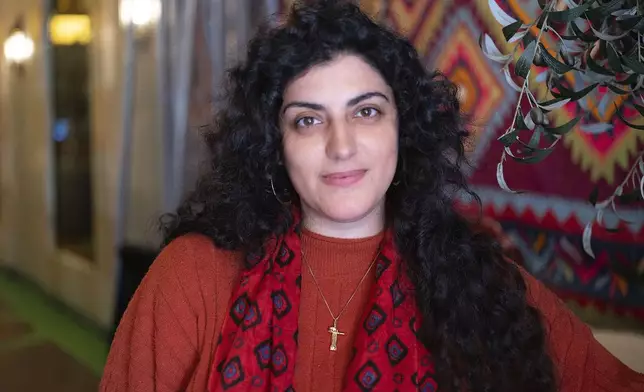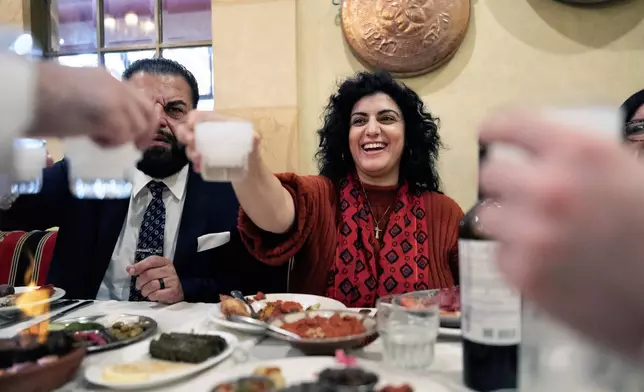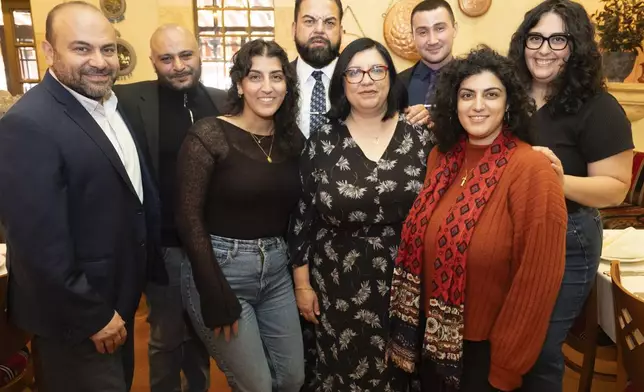The federal government recently reclassified race and ethnicity groups in an effort to better capture the diversity of the United States, but some groups feel the changes miss the mark.
Hmong, Armenian, Black Arab and Brazilian communities in the U.S. say they are not represented accurately in the official numbers. While the revisions were widely applauded, these communities say the changes have created a tension between how the federal government classifies them versus how they identify themselves.
Click to Gallery
Sophia Armen, chair of the Census Committee of the Armenian National Committee of America-Western Region , second from right, poses for a photo with members of the Armenian-American Census Coalition in Glendale, Calif. on Friday, May 17, 2024. From left to right, Taleene Armen, Dr. Armond Aghakhanian, Adrin Nazarian, Suzie Abajian, Edward Barsumian, Sarfis Balkhian, and Naira Shirinian. (AP Photo/Richard Vogel)
Sophia Armen, center is joined for lunch with members of the Armenian-American Census Coalition, Dr. Armond Aghakhanian Burbank Unified School District board member, left, and Suzie Abajian Glendale City Clerk at the Carousel restaurant in Glendale, Calif. on Friday, May 17, 2024. Armen, chair of the Census Committee of the Armenian National Committee of America-Western Region said, because Armenian Americans hailed from places within the Ottoman Empire like Iran or Syria, without Armenian inclusion in the MENA sub-categories, Armenian Americans will likely categorize themselves as being from another country when asked for details about their origins. That could diminish their official numbers and reduce their political power when it comes to redistricting in places with large Armenian communities, such as Los Angeles. (AP Photo/Richard Vogel)
Sophia Armen, chair of the Census Committee of the ANCA (Armenian National Committee of America) Western Region, second from right, poses for a photo with members of the Armenian-American Census Coalition in Glendale, Calif. on Friday, May 17, 2024. From left to right, Former California Assembly Member Adrin Nazarian, Executive Director ANCA-Western Region. Sarfis Balkhian , Taleene Armen, Burbank Unified School District, Dr. Armond Aghakhanian, Glendale City Clerk, Suzie Abajian, ANCA Media coordinator Edward Barsumian, and Armenian-American Action Network Program Coordinator Naira Shirinian. (AP Photo/Richard Vogel)
The federal government recently reclassified race and ethnicity groups in an effort to better capture the diversity of the United States, but some groups feel the changes miss the mark.
Sophia Armen, chair of the Census Committee of the Armenian National Committee of America-Western Region poses for a photo in Glendale, Calif. on Friday, May 17, 2024. Armen said, because Armenian Americans hailed from places within the Ottoman Empire like Iran or Syria, without Armenian inclusion in the MENA sub-categories, Armenian Americans will likely categorize themselves as being from another country when asked for details about their origins. That could diminish their official numbers and reduce their political power when it comes to redistricting in places with large Armenian communities, such as Los Angeles. (AP Photo/Richard Vogel)
Sophia Armen, chair of the Census Committee of the Armenian National Committee of America-Western Region , second from left, is joined at lunch by members of the Armenian-American Census Coalition at the Carousel a Lebanese-Armenian restaurant in Glendale, Calif. on Friday, May 17, 2024. For some race and ethnic groups, how the U.S. government categorizes them for crucial surveys and the once-a-decade census is still falling short. Hmong as well as Armenian, Arab American and Brazilian communities say they feel excluded or diminished when it comes to how they are counted in their own country. (AP Photo/Richard Vogel)
Sophia Armen, chair of the Census Committee of the Armenian National Committee of America-Western Region , second from right, poses for a photo with members of the Armenian-American Census Coalition in Glendale, Calif. on Friday, May 17, 2024. From left to right, Taleene Armen, Dr. Armond Aghakhanian, Adrin Nazarian, Suzie Abajian, Edward Barsumian, Sarfis Balkhian, and Naira Shirinian. (AP Photo/Richard Vogel)
Sophia Armen, chair of the Census Committee of the Armenian National Committee of America-Western Region poses for a photo in Glendale, Calif. on Friday, May 17, 2024. Armen said, because Armenian Americans hailed from places within the Ottoman Empire like Iran or Syria, without Armenian inclusion in the MENA sub-categories, Armenian Americans will likely categorize themselves as being from another country when asked for details about their origins. That could diminish their official numbers and reduce their political power when it comes to redistricting in places with large Armenian communities, such as Los Angeles. (AP Photo/Richard Vogel)
Sophia Armen, center is joined for lunch with members of the Armenian-American Census Coalition, Dr. Armond Aghakhanian Burbank Unified School District board member, left, and Suzie Abajian Glendale City Clerk at the Carousel restaurant in Glendale, Calif. on Friday, May 17, 2024. Armen, chair of the Census Committee of the Armenian National Committee of America-Western Region said, because Armenian Americans hailed from places within the Ottoman Empire like Iran or Syria, without Armenian inclusion in the MENA sub-categories, Armenian Americans will likely categorize themselves as being from another country when asked for details about their origins. That could diminish their official numbers and reduce their political power when it comes to redistricting in places with large Armenian communities, such as Los Angeles. (AP Photo/Richard Vogel)
Sophia Armen, right, chair of the Census Committee of the Armenian National Committee of America-Western Region poses for a photo with Suzie Abajian, Glendale City Clerk and part of the ANCA-WR Census Taskforce who is leading the Armenian-American Census Coalition in Glendale, Calif. on Friday, May 17, 2024. For some race and ethnic groups, how the U.S. government categorizes them for crucial surveys and the once-a-decade census is still falling short. Hmong as well as Armenian, Arab American and Brazilian communities say they feel excluded or diminished when it comes to how they are counted in their own country. (AP Photo/Richard Vogel)
Members of the Armenian-American Census Coalition gather at the Carousel a Lebanese-Armenian restaurant for a working lunch in Glendale, Calif. on Friday, May 17, 2024. For some race and ethnic groups, how the U.S. government categorizes them for crucial surveys and the once-a-decade census is still falling short. Hmong as well as Armenian, Arab American and Brazilian communities say they feel excluded or diminished when it comes to how they are counted in their own country. (AP Photo/Richard Vogel)
Sophia Armen, offers a toast to her colleagues, members of the Armenian-American Census Coalition at the Carousel a Lebanese-Armenian restaurant in Glendale, Calif. on Friday, May 17, 2024. For some race and ethnic groups, how the U.S. government categorizes them for crucial surveys and the once-a-decade census is still falling short. Hmong as well as Armenian, Arab American and Brazilian communities say they feel excluded or diminished when it comes to how they are counted in their own country. (AP Photo/Richard Vogel)
Sophia Armen, chair of the Census Committee of the ANCA (Armenian National Committee of America) Western Region, second from right, poses for a photo with members of the Armenian-American Census Coalition in Glendale, Calif. on Friday, May 17, 2024. From left to right, Former California Assembly Member Adrin Nazarian, Executive Director ANCA-Western Region. Sarfis Balkhian , Taleene Armen, Burbank Unified School District, Dr. Armond Aghakhanian, Glendale City Clerk, Suzie Abajian, ANCA Media coordinator Edward Barsumian, and Armenian-American Action Network Program Coordinator Naira Shirinian. (AP Photo/Richard Vogel)
Sophia Armen, center passes a dish to Dr. Armond Aghakhanian and joined for lunch with other members of the Armenian-American Census Coalition, Suzie Abajian and former California Assembly Member Adrian Nazarian at the Carousel, a Lebanese-Armenian restaurant in Glendale, Calif. on Friday, May 17, 2024. For some race and ethnic groups, how the U.S. government categorizes them for crucial surveys and the once-a-decade census is still falling short. Hmong as well as Armenian, Arab American and Brazilian communities say they feel excluded or diminished when it comes to how they are counted in their own country. (AP Photo/Richard Vogel)
The groups say money, political power and even health could be at stake. Being lumped into the wrong column can mean a gain or loss of government funds that are distributed based on data. For some, it's about their identity and feeling seen by their own country.
The Office of Management and Budget said the working group that oversaw the revisions held 94 “listening sessions” with many advocacy groups, academics and the general public, and it will continue to reach out to communities.
During the Vietnam War and unbeknownst to the American public, the CIA recruited Lao and Hmong people to fight the spread of communism throughout Southeast Asia. Tens of thousands of Hmong soldiers died while others fled to the U.S. as a result of what became known as the “secret war."
By the 1970s, many Hmong had resettled in Minnesota, Wisconsin and central California. Today, Hmong in the U.S. number more than 300,000. Some states recognize Hmong and Lao veterans with annual ceremonies, and in April, the Wisconsin governor signed a law mandating that Hmong American history be taught in schools.
Given their history fighting in that region for the U.S., many Hmong feel strongly that they should be classified as Southeast Asian. But because China is considered the Hmong ancestral homeland, the U.S. Census Bureau categorized them as East Asian after the 2020 census.
“That has been very hurtful to our elders and to our veterans who sacrificed so much to get us here to this country after everything they did to help the U.S. during the Vietnam War,” said May yer Thao, president and CEO of the St. Paul, Minnesota-based Hmong American Partnership.
The East Asian label also pains them because the Hmong were oppressed in China as an ethnic minority and sought refuge in Cambodia, Laos and Vietnam, according to Quyên Dinh, executive director of the Washington, D.C.-based Southeast Asia Resource Action Center.
Those who object to the classification also have a practical concern: the East Asian grouping could hide socioeconomic disparities between Hmong and other Asian households that need to be addressed. The per capita income of Hmong was almost $26,000, while it was more than $53,000 for Asians overall, according to the 2022 American Community Survey.
“We are still one of the most impoverished communities in this nation,” Thao said.
The Census Bureau says it’s working with the Hmong community to improve their classification.
When the government revised its race and ethnicity standards in March — it's first major alteration since 1997 — its seven categories included a new one, Middle Eastern or North African, or MENA. The revisions also encouraged detailed data collection about respondents' backgrounds, such as African American, Jamaican and Haitian under the Black category.
Missing from the list of backgrounds under the new MENA category: Black Arabs from such countries as Somalia and Sudan, and Armenians. The groups were left out after a 2015 field test by the Census Bureau found that most Armenians still identified as white and most Somali and Sudanese respondents identified as Black even when MENA was an option.
Some advocates said the decision to omit Black Arabs from being included in the MENA category was based on outdated research.
For many Armenian Americans, not having their own category amounts to an existential threat as a large part of their diaspora's culture is now concentrated in the United States. Ethnic Armenians also have communities around Europe and the Middle East, in particular Lebanon.
Many are descendants of those who fled the 1915 campaign by Ottoman Turks in which some 1.5 million Armenians died in massacres, deportations and forced marches. The atrocities, which emptied many ethnic areas in eastern Turkey, are widely viewed by historians as genocide. Turkey rejects the description of genocide, saying the toll has been inflated and that those killed were victims of civil war and unrest during World War I.
Without Armenian inclusion in the MENA subcategories, many will likely categorize themselves as being from a different country. That could diminish their official numbers and reduce their power when it comes to redrawing political districts in places with large Armenian communities, said Sophia Armen, chair of the Census Taskforce of the Armenian National Committee of America-Western Region.
“We will now be undercounted by potentially hundreds of thousands of people,” Armen said. “It spells out a very real destruction of Armenian identity in the next two generations.”
During the last redistricting round following the 2020 census, Armenians in greater Los Angeles — which has the largest concentration of Armenians outside Armenia — were almost split up into different city districts, but the redistricting plan was modified after they sounded the alarm. There are an estimated 460,000 Armenian Americans in the U.S., with half living in California, according to the 2022 American Community Survey.
Being identified in the data correctly also is important to local health departments. It can influence anything from vaccination outreach in the proper language to tailoring health campaigns for specific communities.
Armenian Americans, for instance, are more likely to suffer from hypertension than the general population, but there’s not a lot of data.
A coding error last year in an annual Census Bureau survey offered unprecedented insight into how large numbers of Brazilians in the U.S. identify as Hispanic or Latino.
An analysis by Pew Research Center showed that the coding mistake revealed at least 416,000 Brazilians, or more than two-thirds of Brazilians in the U.S., also identified as Hispanic in the 2020 American Community Survey.
Usually, if someone marks Hispanic and Brazilian on the survey, they are recoded as “not Hispanic” when the numbers are crunched.
Not including Brazilians, or Haitians for that matter, in the definition of Hispanic or Latino, means that large numbers of Afro-Latinos aren't counted, Michelle Bueno Vásquez, a Ph.D. candidate in political science at Northwestern University, wrote the Office of Management and Budget.
“The OMB as it stands fails Latinos, especially Afro-Latinos who continually suffer double discrimination and marginalization, on top of statistical invisibility, in the United States,” she said.
Researching the impacts of categorizing Brazilians as Hispanic was among the recommendations a Census Bureau advisory committee made last month.
“Policy is driven by data, first and foremost,” Armen said of people who feel missed in the classifications. “It just seems like we are purposely being ignored.”
Follow Mike Schneider on X, formerly known as Twitter: @MikeSchneiderAP. Tang is a Phoenix-based member of AP’s Race and Ethnicity team. Follow her on X at @ttangAP.
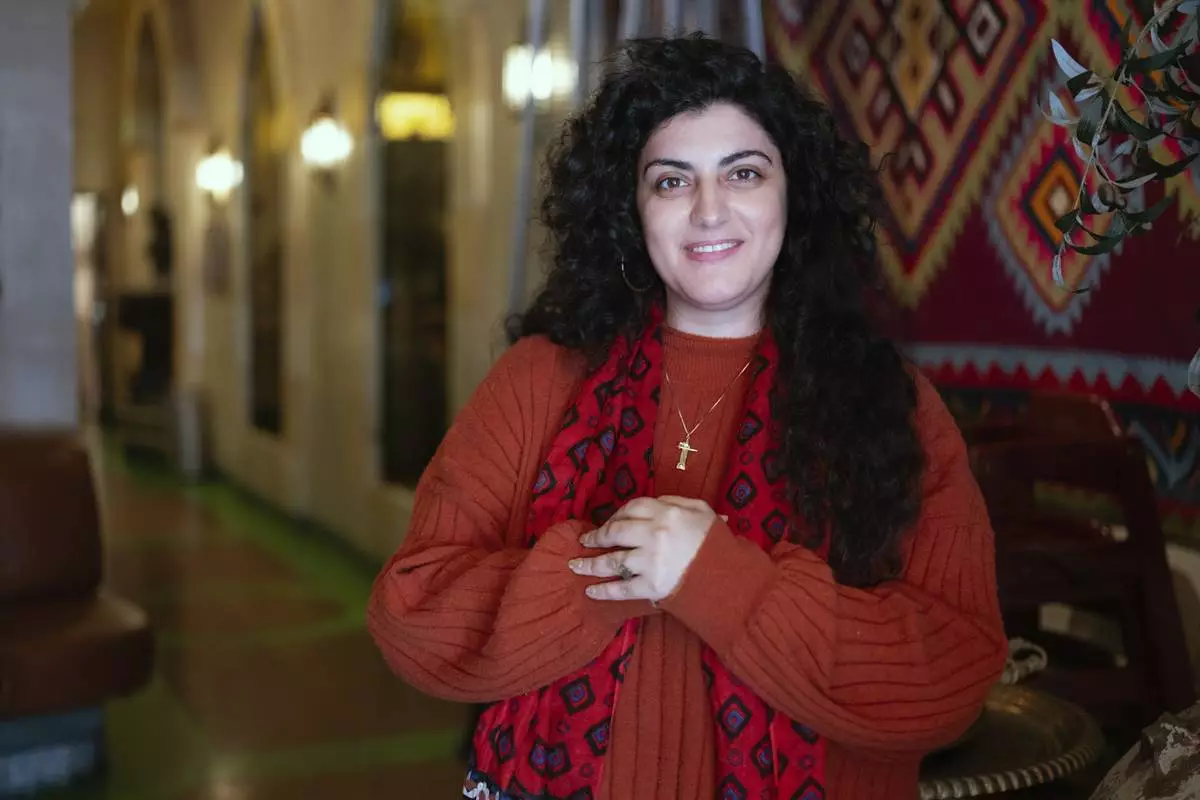
Sophia Armen, chair of the Census Committee of the Armenian National Committee of America-Western Region poses for a photo in Glendale, Calif. on Friday, May 17, 2024. Armen said, because Armenian Americans hailed from places within the Ottoman Empire like Iran or Syria, without Armenian inclusion in the MENA sub-categories, Armenian Americans will likely categorize themselves as being from another country when asked for details about their origins. That could diminish their official numbers and reduce their political power when it comes to redistricting in places with large Armenian communities, such as Los Angeles. (AP Photo/Richard Vogel)

Sophia Armen, chair of the Census Committee of the Armenian National Committee of America-Western Region poses for a photo in Glendale, Calif. on Friday, May 17, 2024. Armen said, because Armenian Americans hailed from places within the Ottoman Empire like Iran or Syria, without Armenian inclusion in the MENA sub-categories, Armenian Americans will likely categorize themselves as being from another country when asked for details about their origins. That could diminish their official numbers and reduce their political power when it comes to redistricting in places with large Armenian communities, such as Los Angeles. (AP Photo/Richard Vogel)
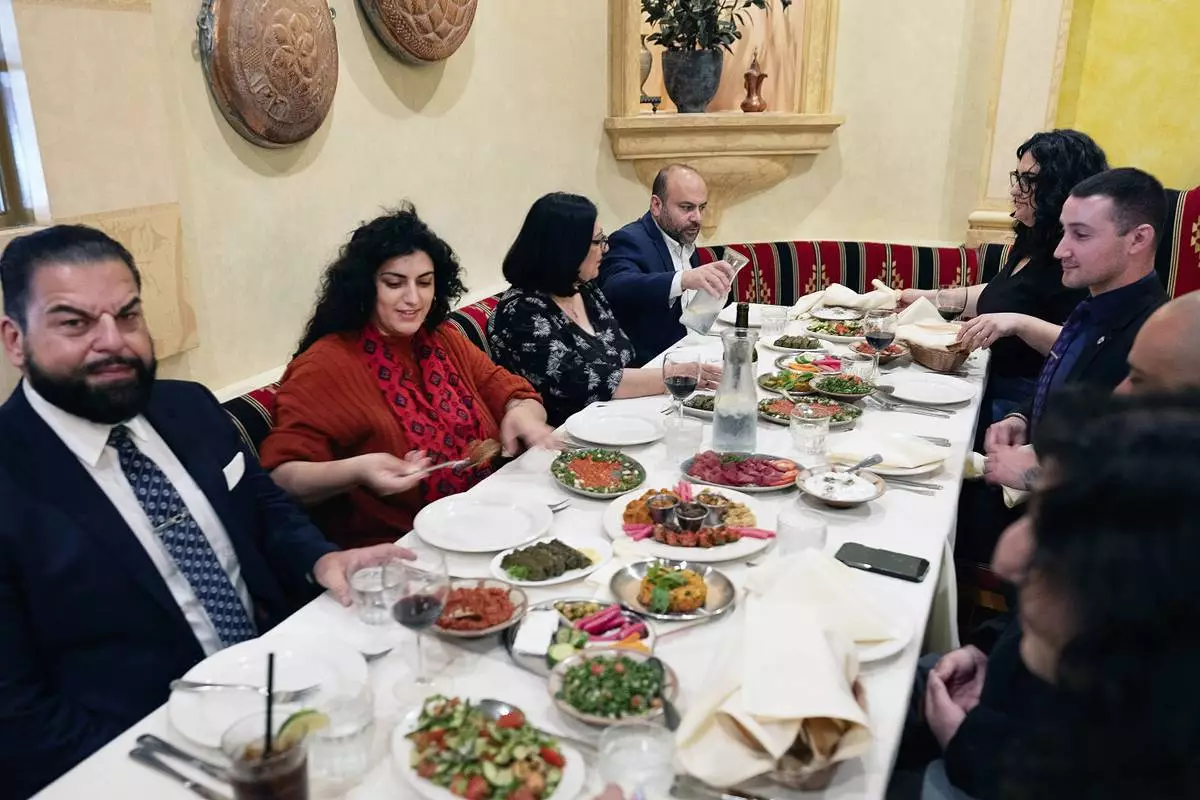
Sophia Armen, chair of the Census Committee of the Armenian National Committee of America-Western Region , second from left, is joined at lunch by members of the Armenian-American Census Coalition at the Carousel a Lebanese-Armenian restaurant in Glendale, Calif. on Friday, May 17, 2024. For some race and ethnic groups, how the U.S. government categorizes them for crucial surveys and the once-a-decade census is still falling short. Hmong as well as Armenian, Arab American and Brazilian communities say they feel excluded or diminished when it comes to how they are counted in their own country. (AP Photo/Richard Vogel)
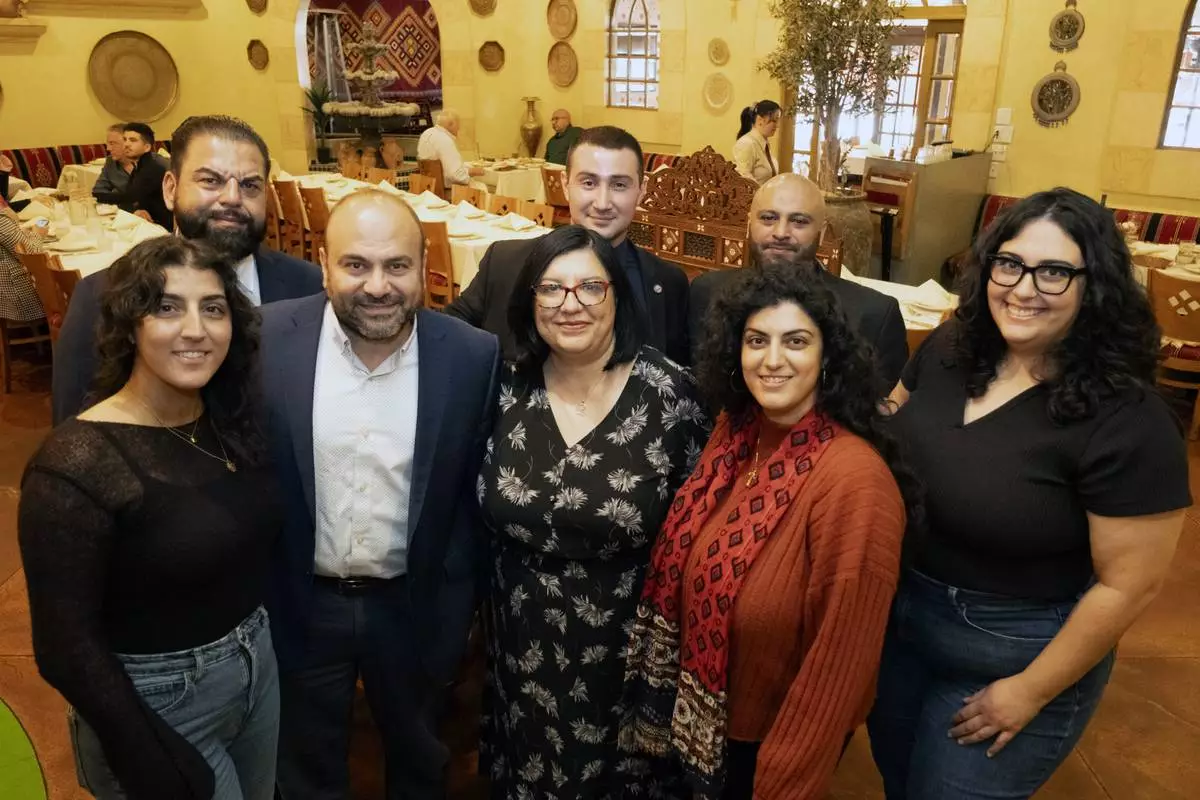
Sophia Armen, chair of the Census Committee of the Armenian National Committee of America-Western Region , second from right, poses for a photo with members of the Armenian-American Census Coalition in Glendale, Calif. on Friday, May 17, 2024. From left to right, Taleene Armen, Dr. Armond Aghakhanian, Adrin Nazarian, Suzie Abajian, Edward Barsumian, Sarfis Balkhian, and Naira Shirinian. (AP Photo/Richard Vogel)
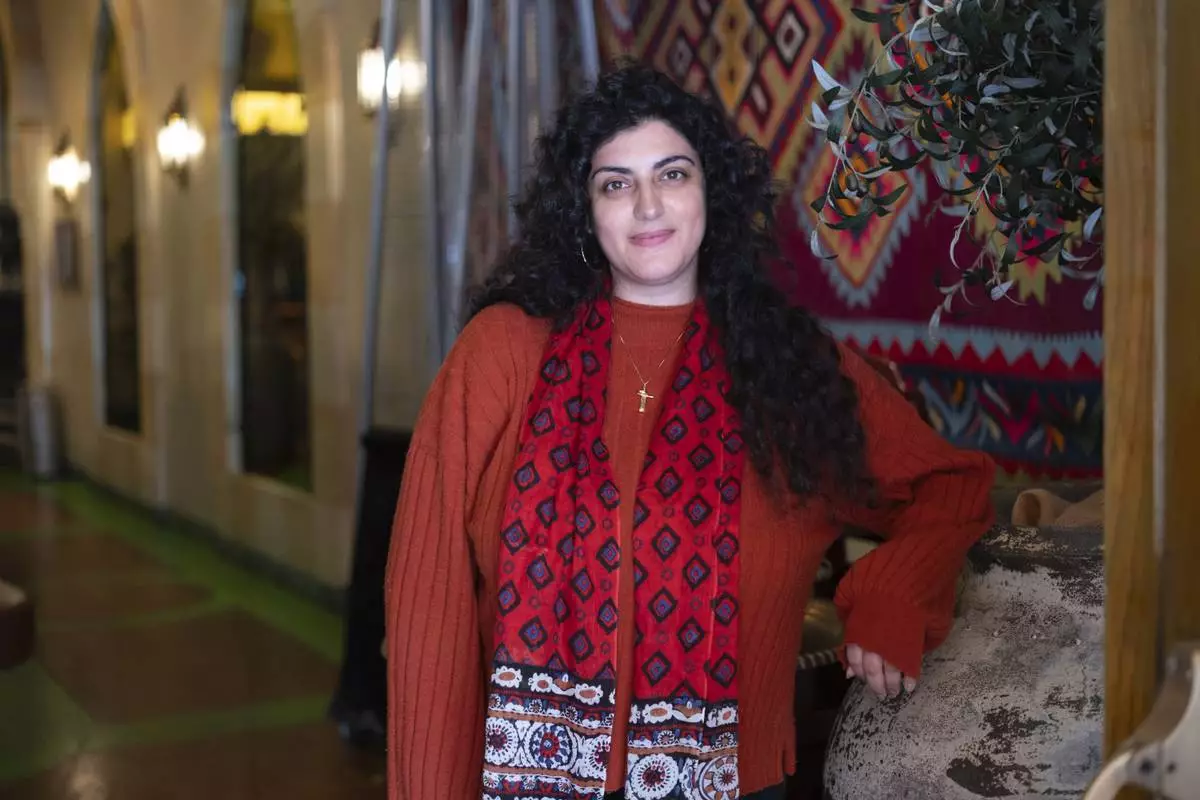
Sophia Armen, chair of the Census Committee of the Armenian National Committee of America-Western Region poses for a photo in Glendale, Calif. on Friday, May 17, 2024. Armen said, because Armenian Americans hailed from places within the Ottoman Empire like Iran or Syria, without Armenian inclusion in the MENA sub-categories, Armenian Americans will likely categorize themselves as being from another country when asked for details about their origins. That could diminish their official numbers and reduce their political power when it comes to redistricting in places with large Armenian communities, such as Los Angeles. (AP Photo/Richard Vogel)
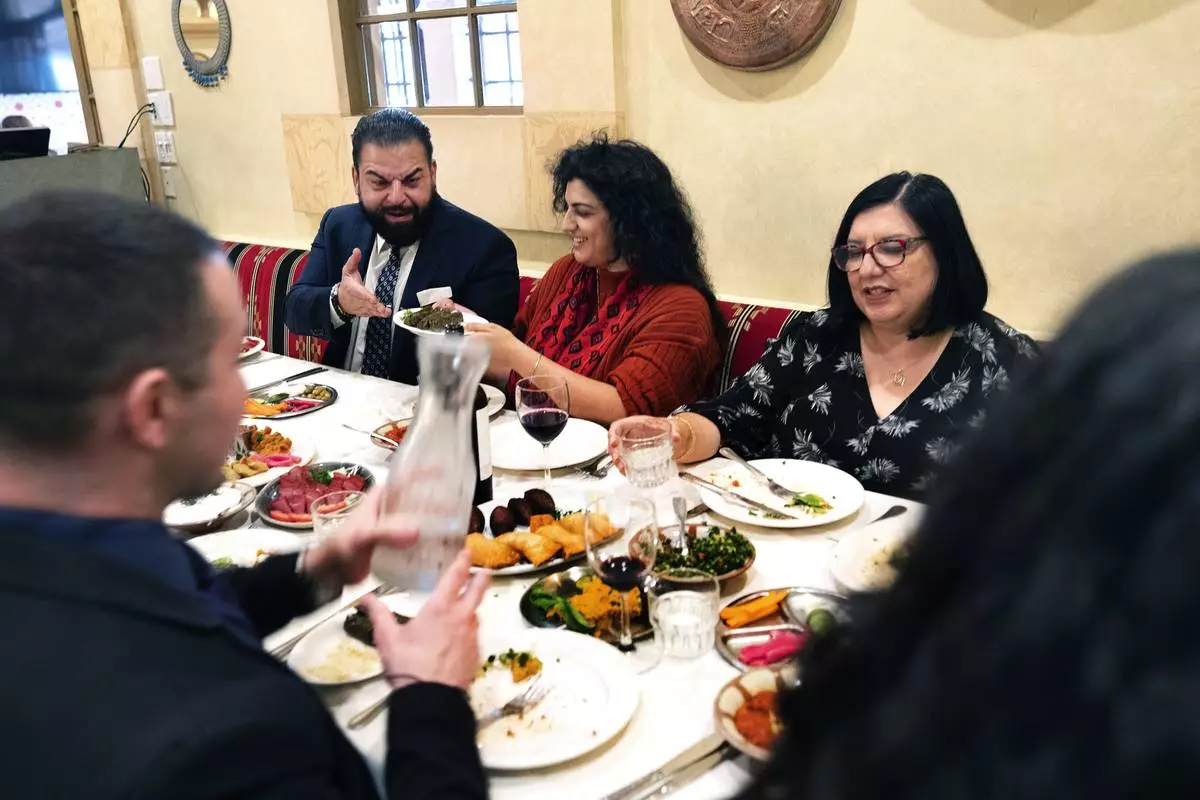
Sophia Armen, center is joined for lunch with members of the Armenian-American Census Coalition, Dr. Armond Aghakhanian Burbank Unified School District board member, left, and Suzie Abajian Glendale City Clerk at the Carousel restaurant in Glendale, Calif. on Friday, May 17, 2024. Armen, chair of the Census Committee of the Armenian National Committee of America-Western Region said, because Armenian Americans hailed from places within the Ottoman Empire like Iran or Syria, without Armenian inclusion in the MENA sub-categories, Armenian Americans will likely categorize themselves as being from another country when asked for details about their origins. That could diminish their official numbers and reduce their political power when it comes to redistricting in places with large Armenian communities, such as Los Angeles. (AP Photo/Richard Vogel)
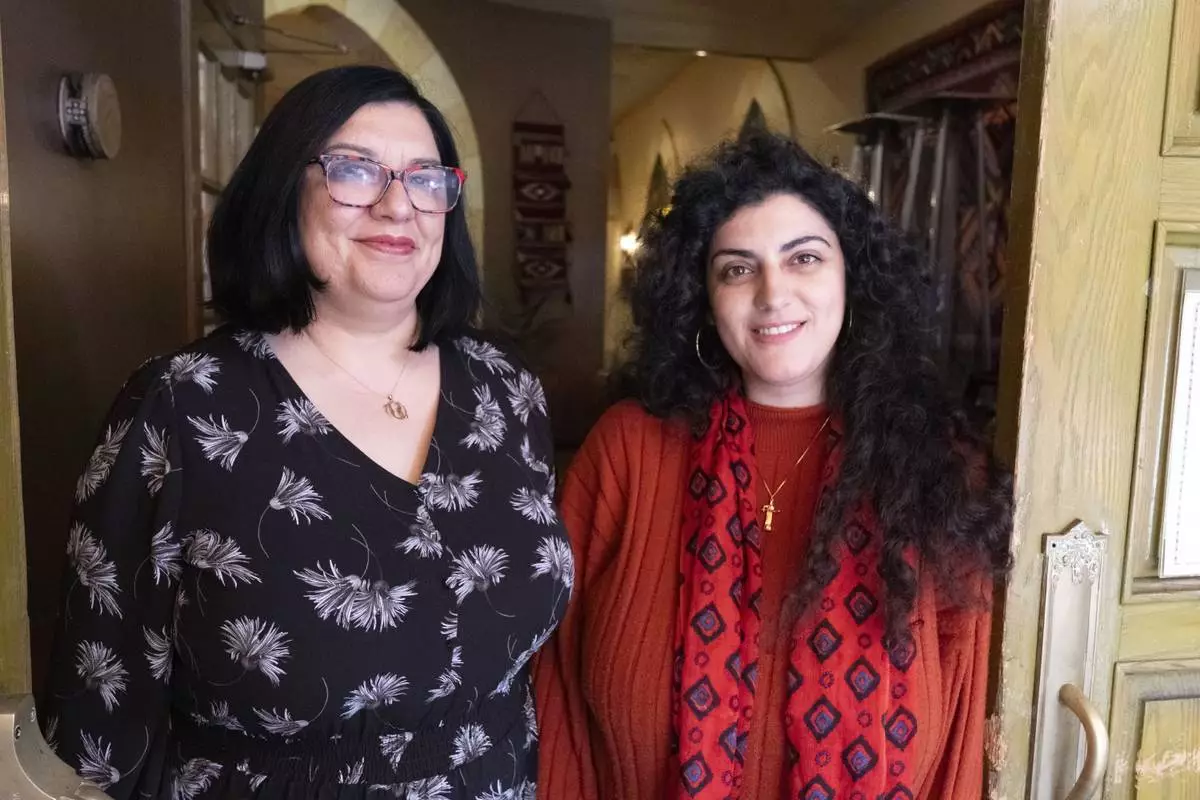
Sophia Armen, right, chair of the Census Committee of the Armenian National Committee of America-Western Region poses for a photo with Suzie Abajian, Glendale City Clerk and part of the ANCA-WR Census Taskforce who is leading the Armenian-American Census Coalition in Glendale, Calif. on Friday, May 17, 2024. For some race and ethnic groups, how the U.S. government categorizes them for crucial surveys and the once-a-decade census is still falling short. Hmong as well as Armenian, Arab American and Brazilian communities say they feel excluded or diminished when it comes to how they are counted in their own country. (AP Photo/Richard Vogel)

Members of the Armenian-American Census Coalition gather at the Carousel a Lebanese-Armenian restaurant for a working lunch in Glendale, Calif. on Friday, May 17, 2024. For some race and ethnic groups, how the U.S. government categorizes them for crucial surveys and the once-a-decade census is still falling short. Hmong as well as Armenian, Arab American and Brazilian communities say they feel excluded or diminished when it comes to how they are counted in their own country. (AP Photo/Richard Vogel)

Sophia Armen, offers a toast to her colleagues, members of the Armenian-American Census Coalition at the Carousel a Lebanese-Armenian restaurant in Glendale, Calif. on Friday, May 17, 2024. For some race and ethnic groups, how the U.S. government categorizes them for crucial surveys and the once-a-decade census is still falling short. Hmong as well as Armenian, Arab American and Brazilian communities say they feel excluded or diminished when it comes to how they are counted in their own country. (AP Photo/Richard Vogel)

Sophia Armen, chair of the Census Committee of the ANCA (Armenian National Committee of America) Western Region, second from right, poses for a photo with members of the Armenian-American Census Coalition in Glendale, Calif. on Friday, May 17, 2024. From left to right, Former California Assembly Member Adrin Nazarian, Executive Director ANCA-Western Region. Sarfis Balkhian , Taleene Armen, Burbank Unified School District, Dr. Armond Aghakhanian, Glendale City Clerk, Suzie Abajian, ANCA Media coordinator Edward Barsumian, and Armenian-American Action Network Program Coordinator Naira Shirinian. (AP Photo/Richard Vogel)

Sophia Armen, center passes a dish to Dr. Armond Aghakhanian and joined for lunch with other members of the Armenian-American Census Coalition, Suzie Abajian and former California Assembly Member Adrian Nazarian at the Carousel, a Lebanese-Armenian restaurant in Glendale, Calif. on Friday, May 17, 2024. For some race and ethnic groups, how the U.S. government categorizes them for crucial surveys and the once-a-decade census is still falling short. Hmong as well as Armenian, Arab American and Brazilian communities say they feel excluded or diminished when it comes to how they are counted in their own country. (AP Photo/Richard Vogel)
ALGIERS, Algeria (AP) — Algerians voted Saturday in an election to decide whether army-backed President Abdelmadjid Tebboune gets another term in office — five years after pro-democracy protests prompted the military to oust the previous president after two decades in power.
There is little suspense about the result with Tebboune expected to win easily. The question is more about how many voters cast ballots.
Tebboune said after voting that he hoped “whoever wins will continue on the path towards a point of no return in the construction of democracy.”
Polls closed late Saturday and vote counting was underway as Algerians awaited an announcement of the results. The country's election authority at 12:10 a.m. said that vote counting to so far suggested voter turnout was 48% in Algeria and 19.6% for precincts abroad — outpacing the country’s 2019 presidential election, where 39.9% of voters turned out to vote.
It's unclear whether Tebboune will consider such a figure a triumph. In the lead-up to Saturday, his backers and rivals all urged Algerians to come out and vote after boycotts and high abstention rates in previous elections marred the government's ability to claim popular support.
Algeria is Africa's largest country by area and, with almost 45 million people, it's the continent's second most populous after South Africa to hold presidential elections in 2024 — a year in which more than 50 elections are being held worldwide, encompassing more than half the world's population.
The campaign — rescheduled earlier this year to take place during North Africa's hot summer — was characterized by apathy from the population, which continues to be plagued by a high cost of living and drought that brought water shortages to some parts of the country.
“Uncle Tebboune," as his campaign called the 78-year-old, was elected in December 2019 after nearly a year of weekly “Hirak” demonstrations demanding the resignation of former President Abdelaziz Bouteflika. Their demands were met when Bouteflika resigned and was replaced by an interim government of his former allies, which called for elections later in the year.
Protesters opposed holding elections so soon, fearing the candidates running that year were close to the old regime and would derail dreams of a civilian-led, non-military state. Tebboune, a former prime minister seen as close to the military, won. But his victory was stained by boycotts and election day tumult.
Throughout his tenure, Tebboune has used oil and gas revenue to boost some social benefits — including unemployment insurance as well as public wages and pensions — to calm discontent. To cement his legitimacy, Tebboune hopes more of the country's 24 million eligible voters participate in Saturday's election than in his first election when only 39.9% voted.
Many Algerians remain unconvinced that elections will usher in change.
Activists and international organizations, including Amnesty International, have railed against how authorities continue prosecuting those involved in opposition parties, media organizations and civil society groups.
Some have denounced this election as a rubber stamp exercise that can only entrench the status quo.
“Algerians don’t give a damn about this bogus election,” said former Hirak leader Hakim Addad, who was banned from participating in politics three years ago. “The political crisis will persist as long as the regime remains in place. The Hirak has spoken.”
Twenty-six candidates submitted preliminary paperwork to run in the election, although only two were ultimately approved to challenge Tebboune.
Both avoided directly criticizing Tebboune on the campaign trail and, like the incumbent, emphasized election participation.
Abdelali Hassani Cherif, a 57-year-old head of the Islamist party Movement of Society for Peace, made populist appeals to Algerian youth, running on the slogan “Opportunity!” Youcef Aouchiche, a 41-year-old former journalist running with the Socialist Forces Front, or FFS, campaigned on a “vision for tomorrow.”
Both challengers and their parties risked losing backing from supporters who thought they were selling out by giving the impression the election was democratic and contested.
Walking near a vote center in downtown Algiers, longtime FFS supporter Mhand Kasdi said his party had betrayed its ideals by putting forth a candidate for the first time since 1999.
“It is giving its backing to a rigged election,” the 55-year-old gas station manager said, adding that Aouchiche and Hassani “are going to help make the regime's candidate look good."
Voting in his hometown Saturday, Aouchiche called on Algerians to vote for him “to give young people the confidence to put an end to the despair that drives them to take the boats of death in an attempt to reach the other side of the Mediterranean,” referring to those who migrate to Europe.
Andrew Farrand, the Middle East and North Africa director at the geopolitical risk consultancy Horizon Engage, said both challengers were looking more at the 2025 legislative elections than this 2024 presidential contest. Because Algerian law funds political parties based on the number of seats they win in legislative elections, they hope campaigning now positions them for a strong 2025 performance.
“It’s a long game: How can I mobilize my base? How can I build up a campaign machine? And how can I get into the good graces of the authorities so that I can be in a position to increase my seats?” he said. “We’ve seen that in their choice not to overtly criticize president … paired with a very strong message to Algerians to come out and vote.”

Presidential candidate of the Movement of Society for Peace (MSP), Abdelali Hassani Cherif, prepares to cast his ballot inside a polling station during the presidential election, Saturday, Sept. 7, 2024, in Algiers, Algeria. (AP Photo/Fateh Guidoum)
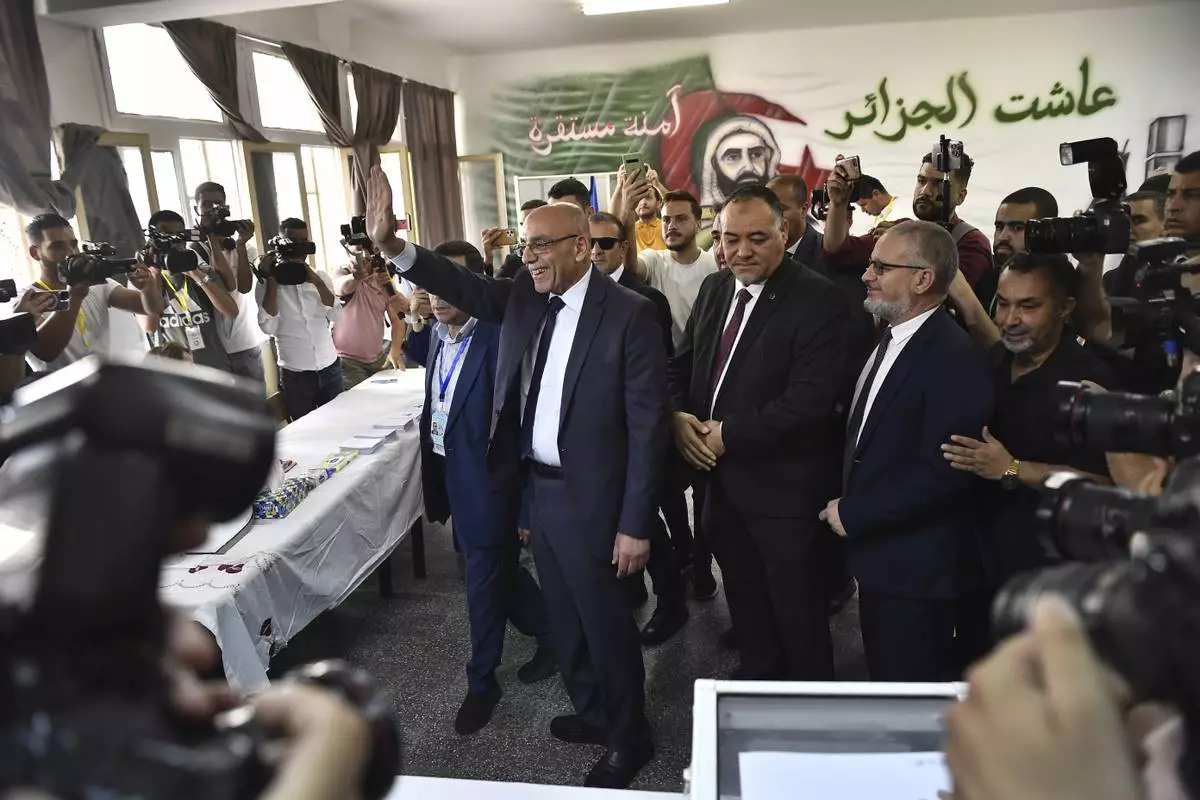
Presidential candidate of the Movement of Society for Peace (MSP), Abdelali Hassani Cherif, prepares to cast his ballot inside a polling station during the presidential election, Saturday, Sept. 7, 2024, in Algiers, Algeria. (AP Photo/Fateh Guidoum)

Presidential candidate and leader of the FFS party, Youcef Aouchich, casts his ballot inside a polling station during the presidential elections, Saturday, Sept. 7, 2024, in Tizi Ouzou, Algeria. (AP Photo)
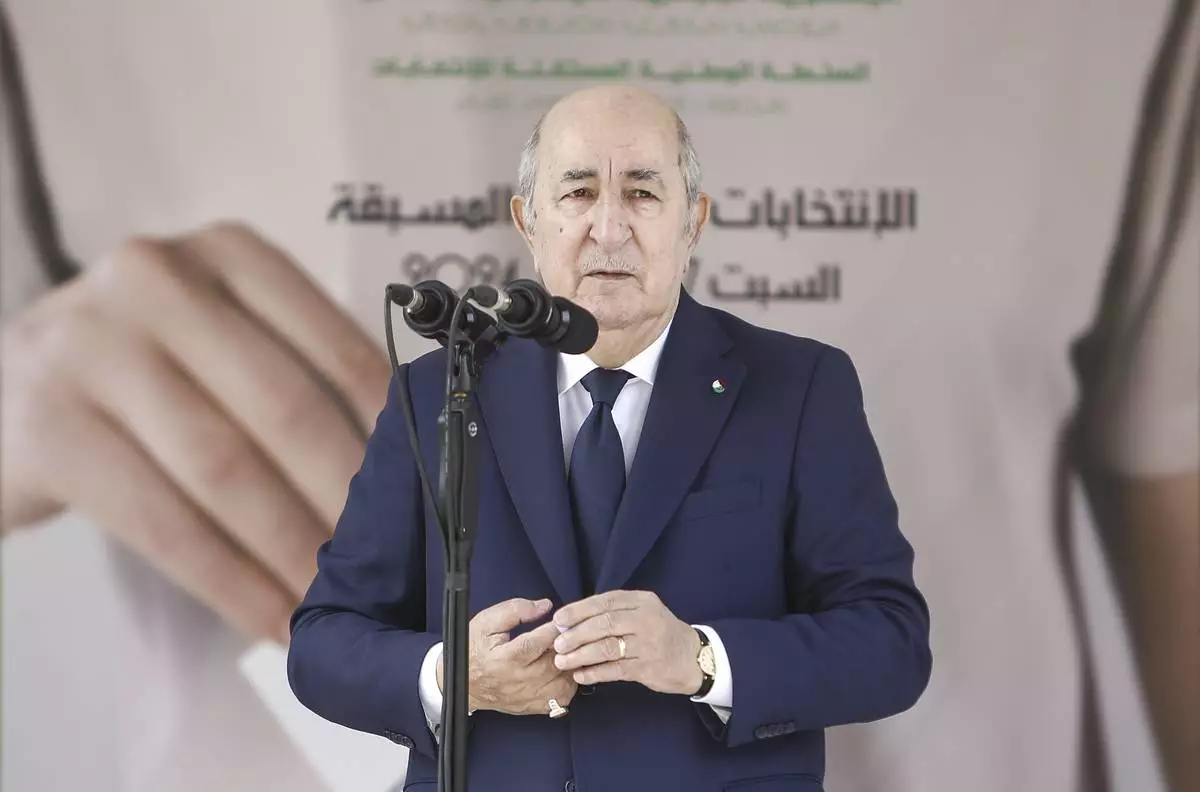
Algerian president and candidate for re-election Abdelmajid Tebboune speaks after casting his ballot inside a polling station during the presidential elections, Saturday, Sept. 7, 2024, in Algiers, Algeria. (AP Photo)
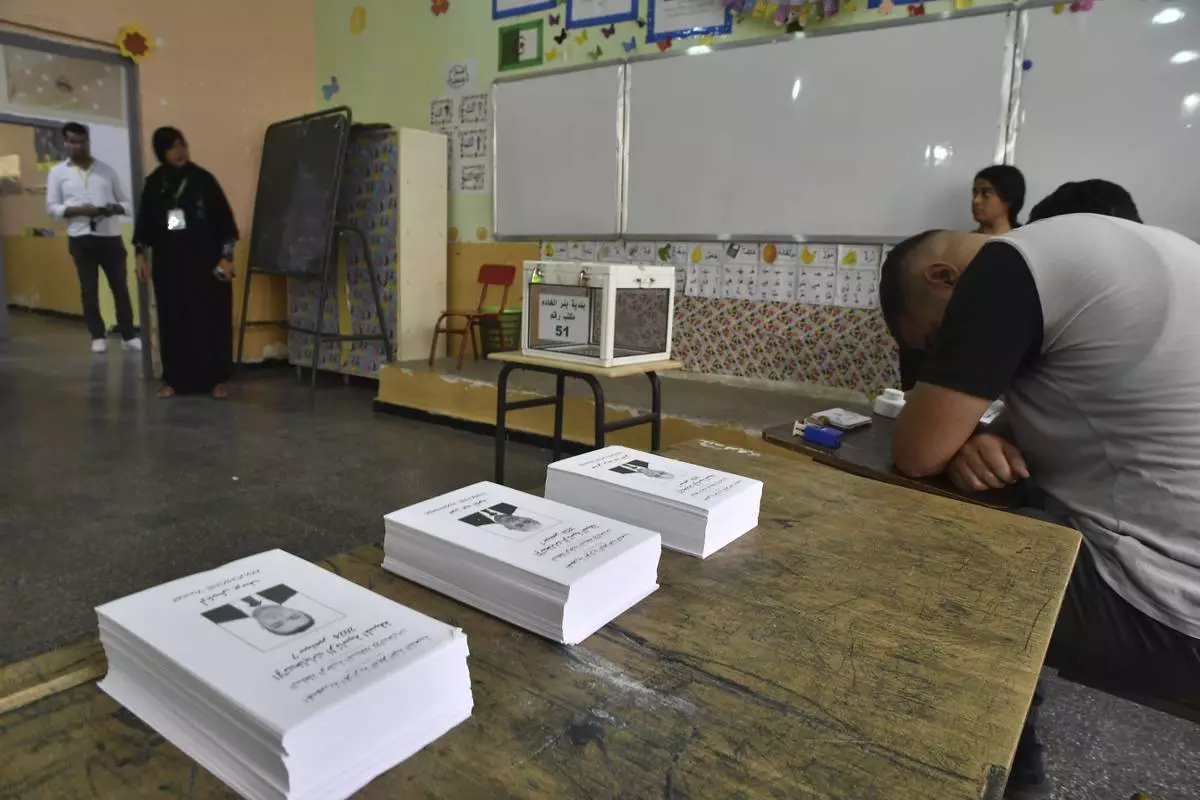
Election officials wait for voters inside a polling station during the presidential election, Saturday, Sept. 7, 2024, in Algiers, Algeria. (AP Photo/Fateh Guidoum)
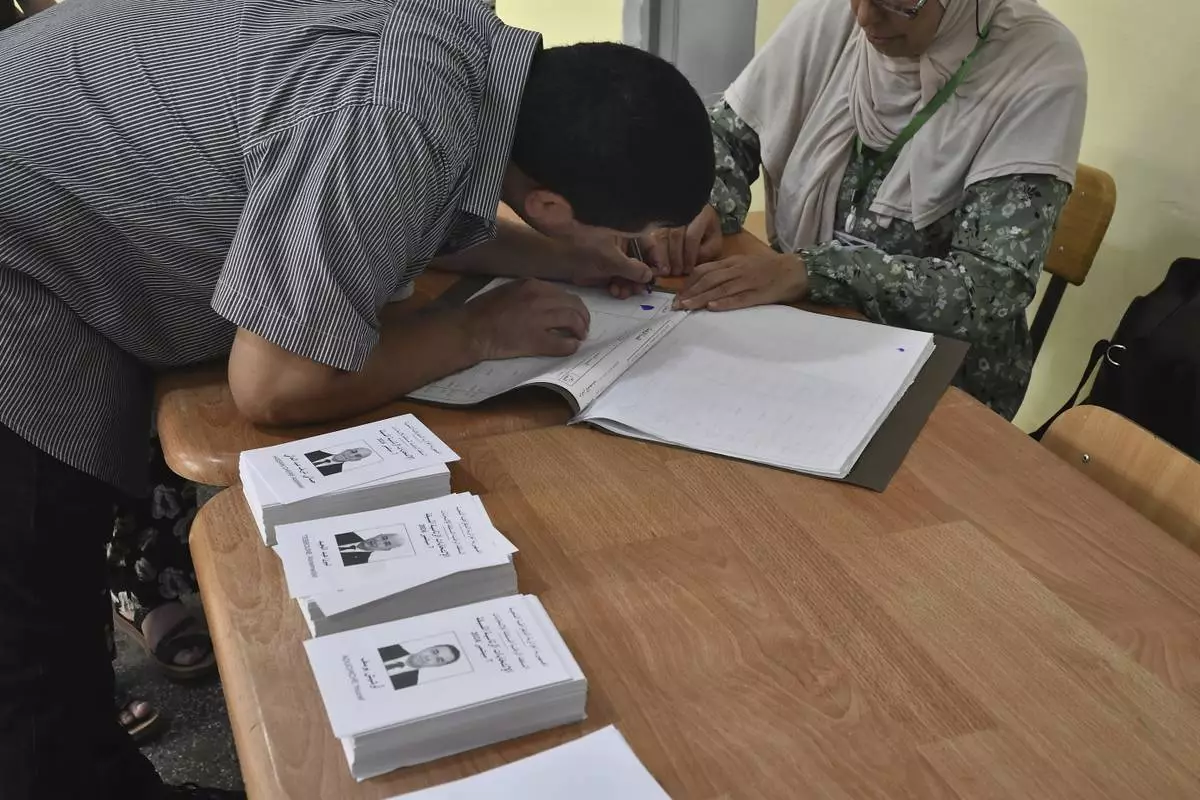
A voter prepares to cast his ballot inside a polling station during the presidential election, Saturday, Sept. 7, 2024, in Algiers, Algeria. (AP Photo/Fateh Guidoum)
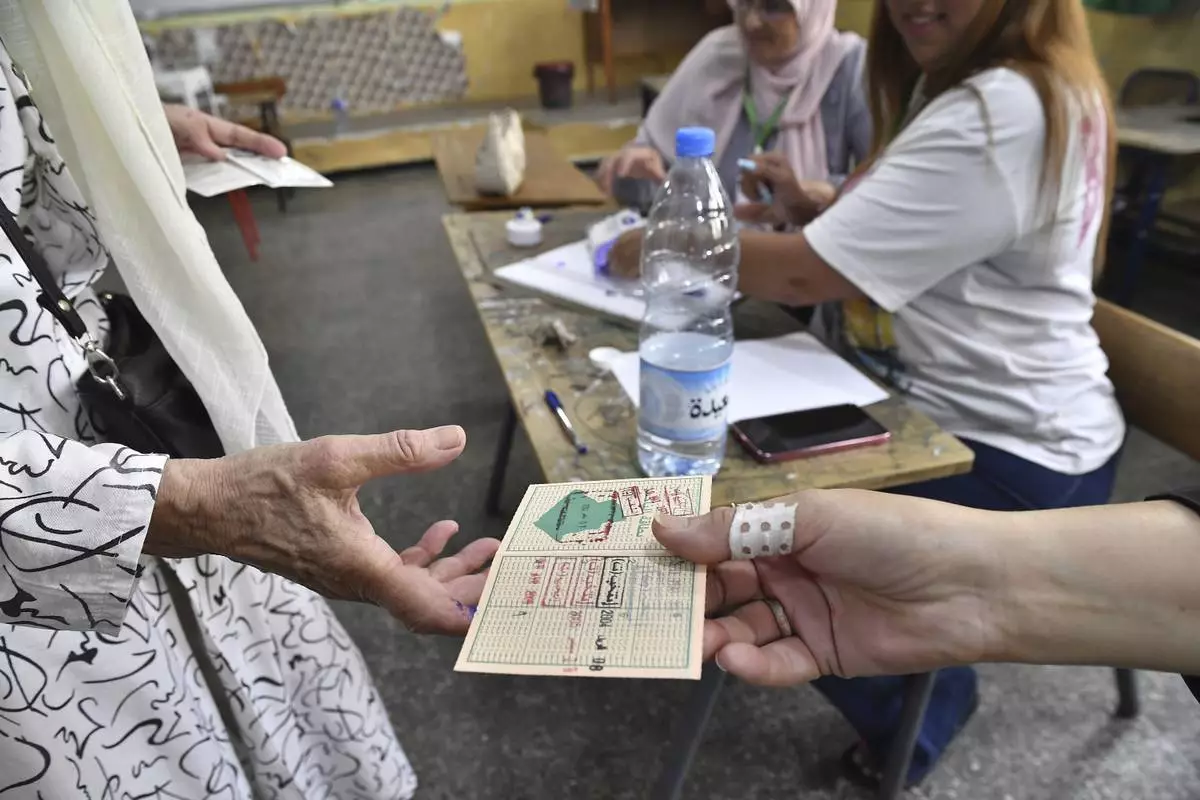
A voter prepares to cast her ballot inside a polling station during the presidential elections, Saturday, Sept. 7, 2024, in Algiers, Algeria. (AP Photo/Fateh Guidoum)
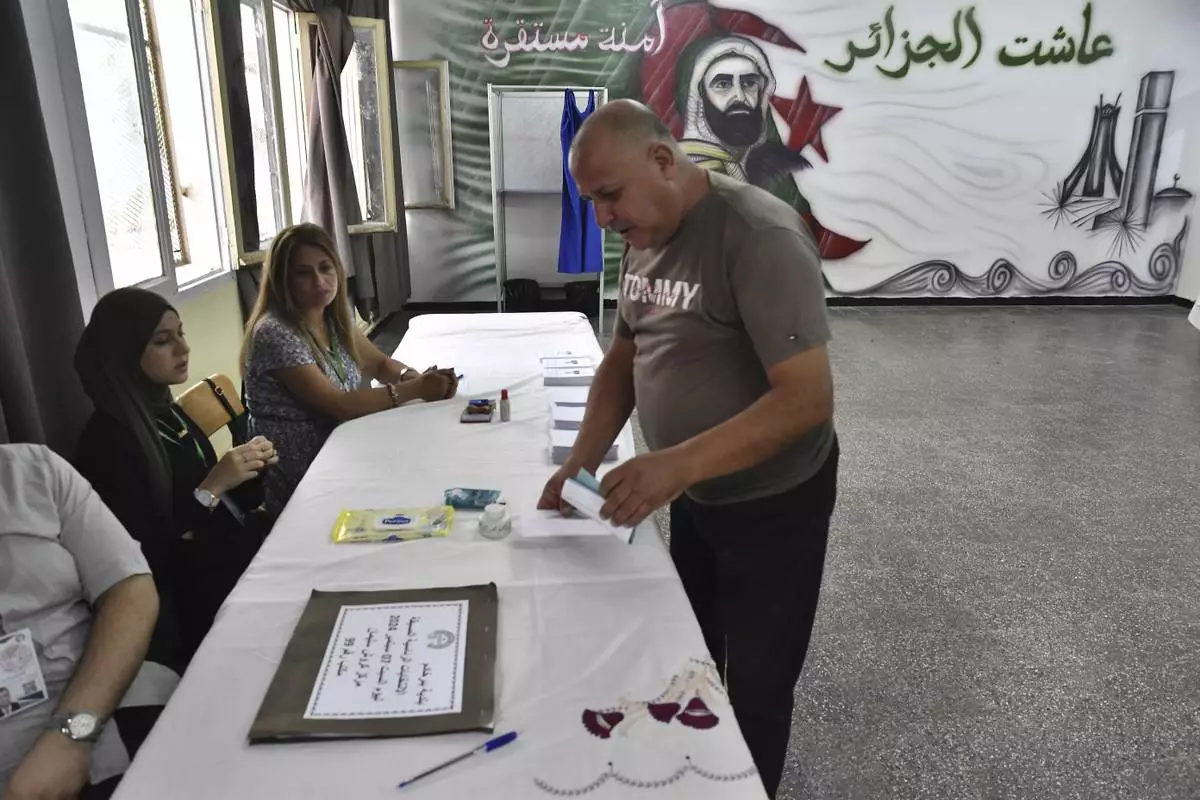
A voter prepares to cast his ballot inside a polling station during the presidential election, Saturday, Sept. 7, 2024, in Algiers, Algeria. (AP Photo/Fateh Guidoum)
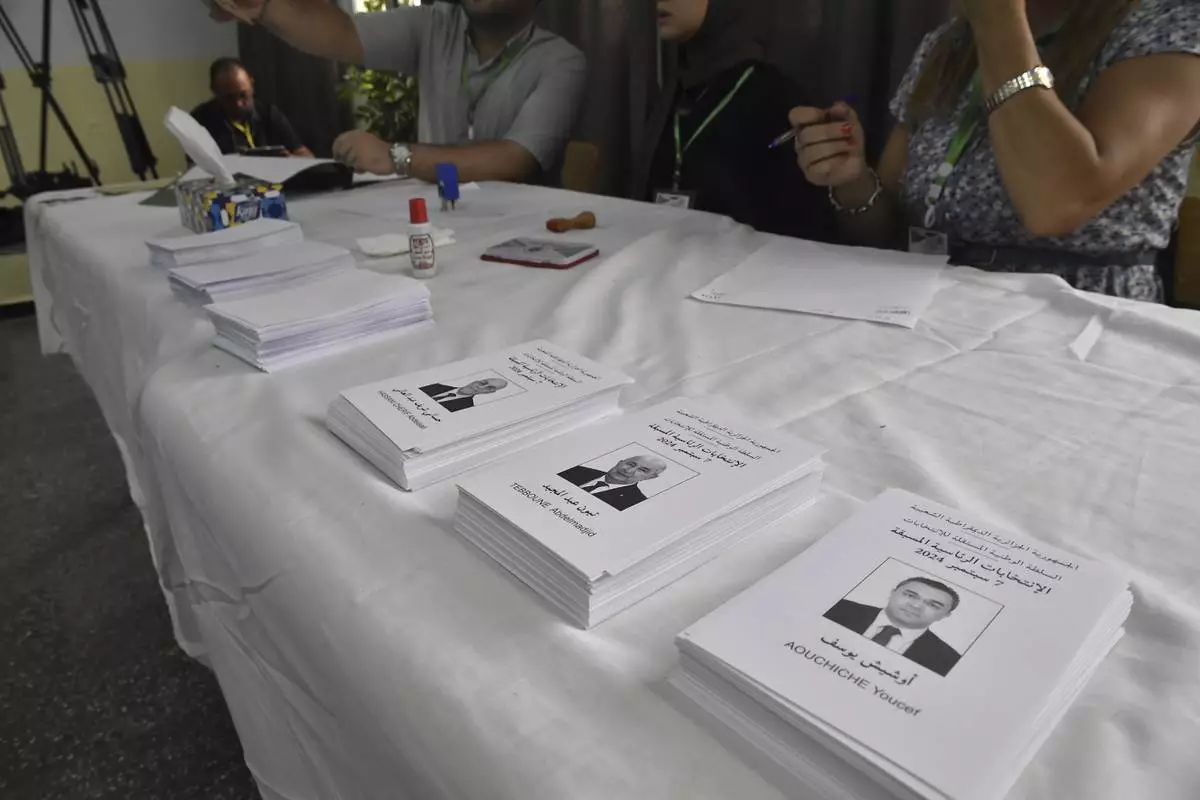
Ballots showing presidential candidates inside a polling station during the presidential election, Saturday, Sept. 7, 2024, in Algiers, Algeria. (AP Photo/Fateh Guidoum)
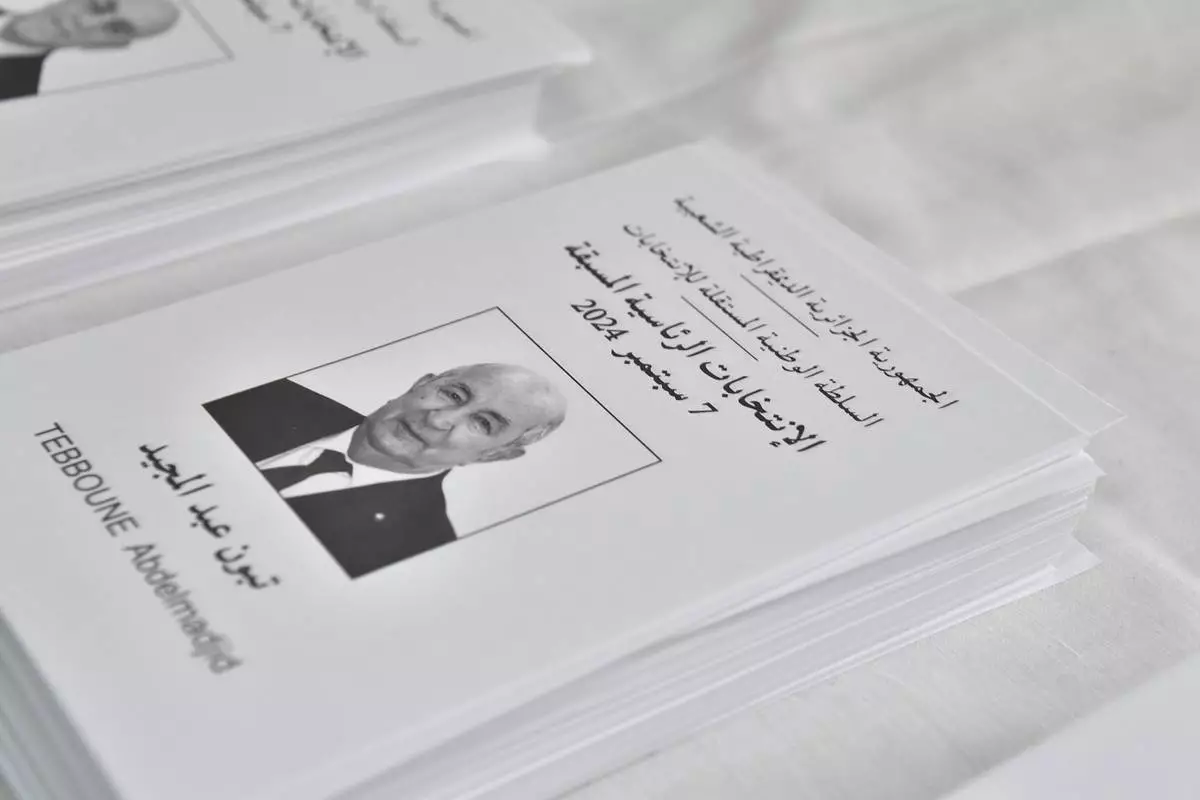
A ballot showing Algerian president and candidate for re-election Abdelmajid Tebboune, inside a polling station during the presidential election, Saturday, Sept. 7, 2024, in Algiers, Algeria. (AP Photo/Fateh Guidoum)
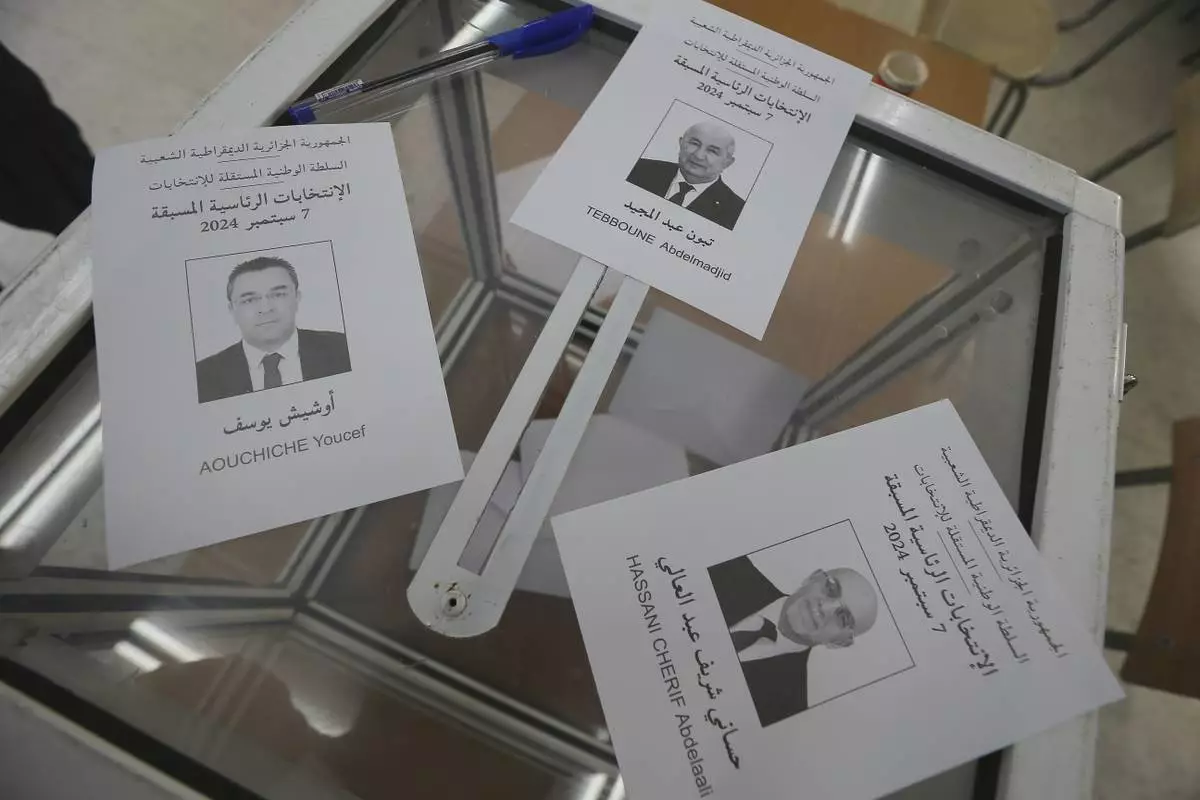
Ballots showing the three presidential candidates are placed on a table inside a polling station during the presidential election, Saturday, Sept. 7, 2024, in Algiers, Algeria. (AP Photo/Anis Belghoul)
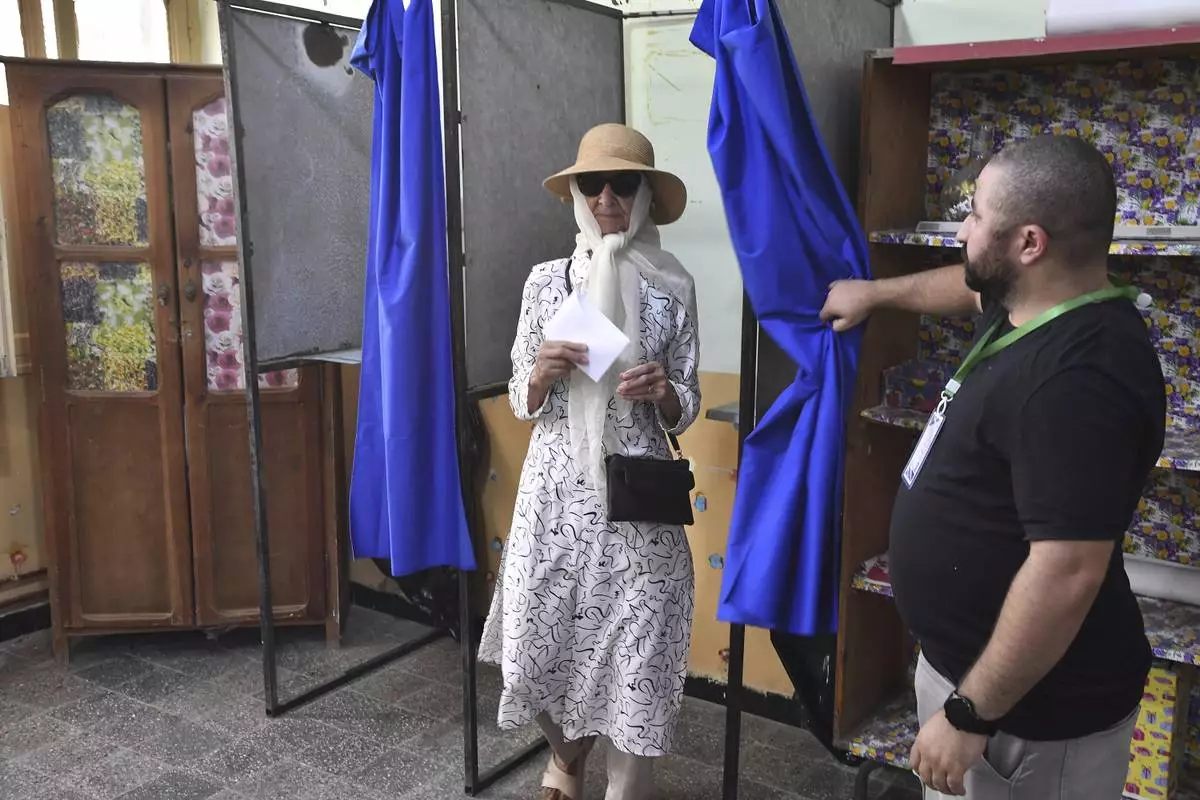
A voter prepares to cast her ballot inside a polling station during the presidential elections, Saturday, Sept. 7, 2024, in Algiers, Algeria. (AP Photo/Fateh Guidoum)
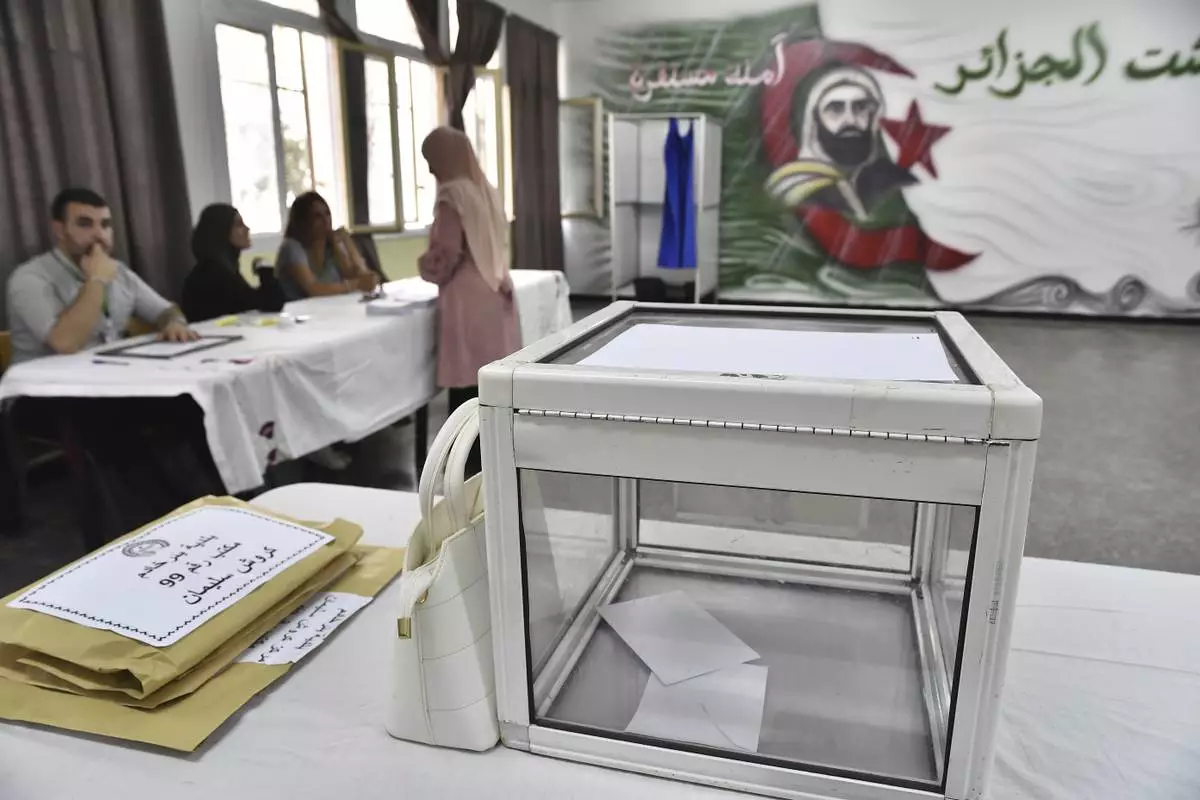
Election officials wait for voters inside a polling station during the presidential election, Saturday, Sept. 7, 2024, in Algiers, Algeria. (AP Photo/Fateh Guidoum)
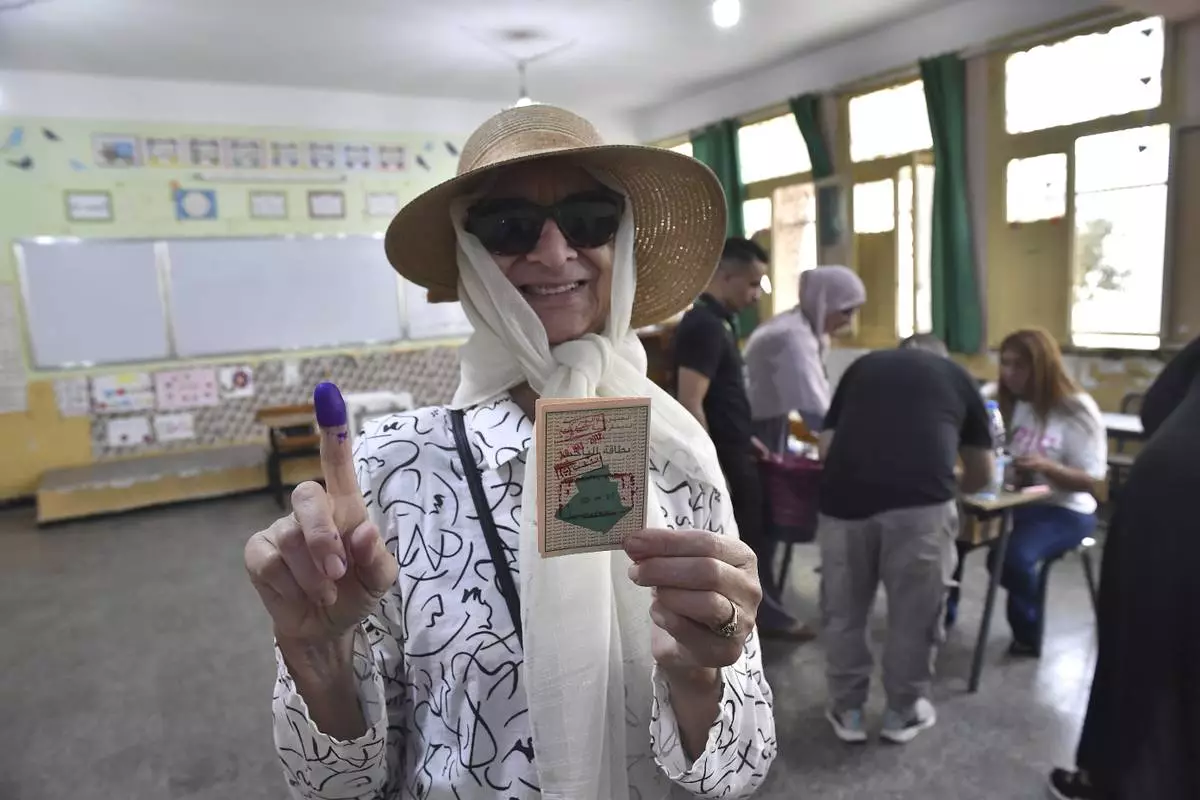
A voter poses for a photo with her inked finger after casting her ballot inside a polling station during the presidential elections, Saturday, Sept. 7, 2024, in Algiers, Algeria. (AP Photo/Fateh Guidoum)
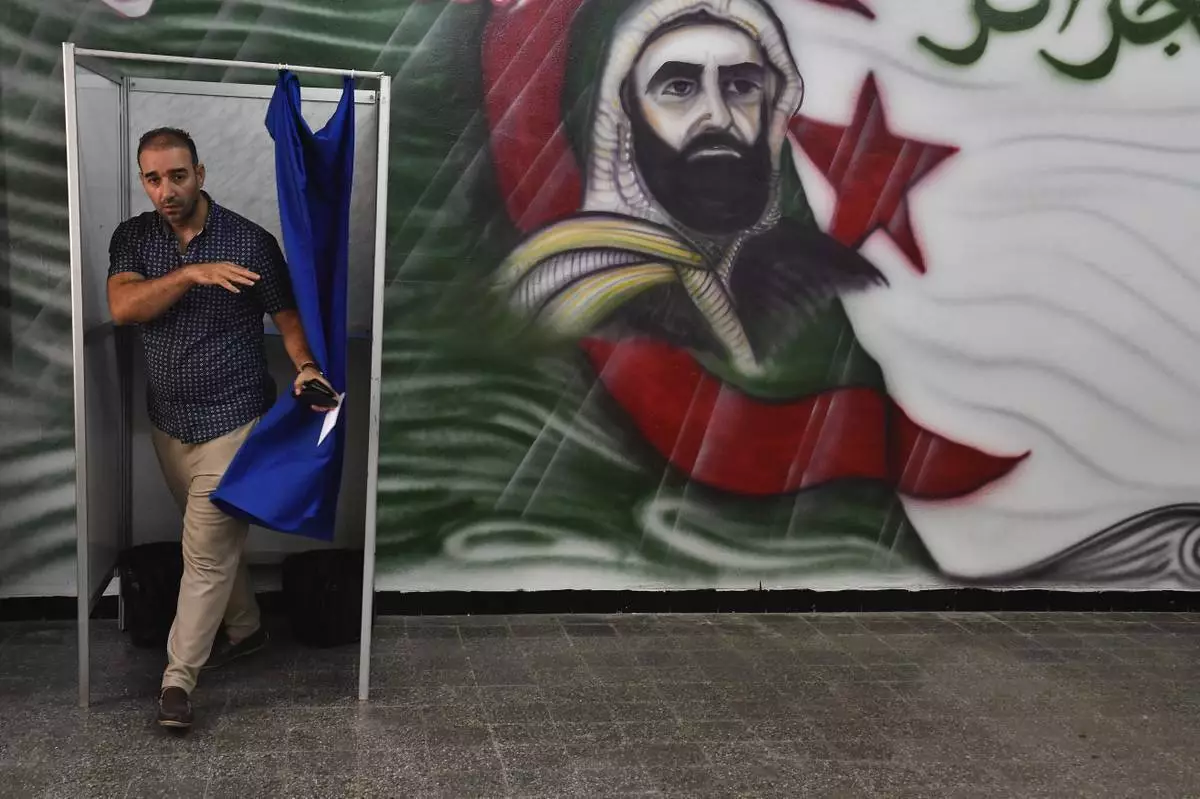
CORRECTS DATE - A voter prepares to cast his ballot inside a polling station during the presidential election, Saturday, Sept. 7, 2024, in Algiers, Algeria. (AP Photo/Fateh Guidoum)
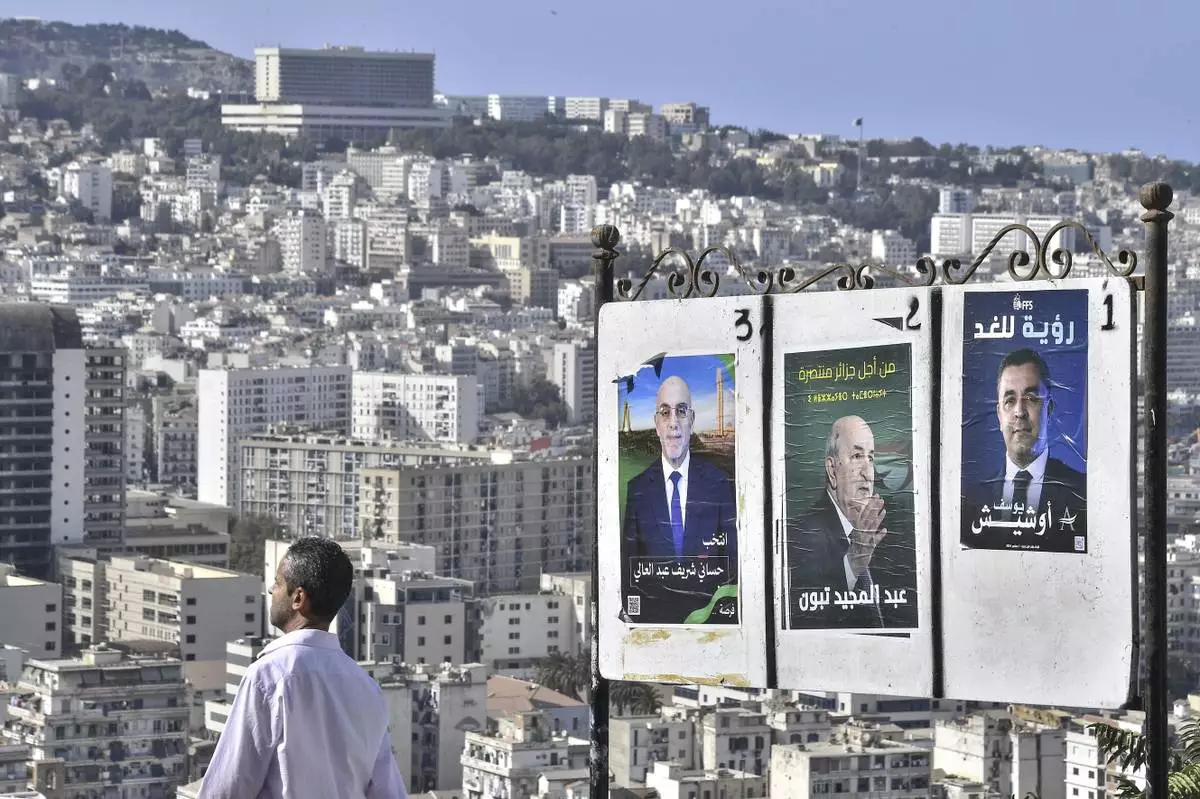
A man walks past electoral banners of presidential candidate, including President Abdelmadjid Tebboune, center, Tuesday, Aug. 27, 2024, in Algiers, Algeria. (AP Photo/Fateh Guidoum)

Algerian president and candidate for re-election Abdelmajid Tebboune delivers a speech during his campaign for the upcoming presidential election, in Oran, Algeria, Sunday, Aug. 26, 2024. (AP Photo/Str)















